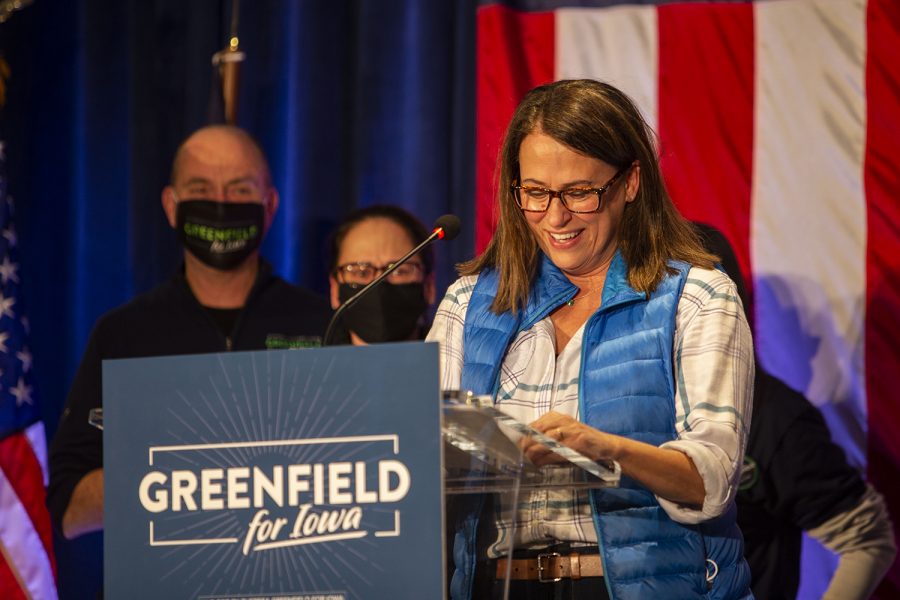Theresa Greenfield’s record-breaking fundraising did not deliver Iowa’s Senate seat
Democrat Theresa Greenfield spent twice as much money as incumbent Sen. Joni Ernst, but President Trump’s coattails may have led Ernst to victory.
Democratic candidate for senate Theresa Greenfield speaks during a watch party for her campaign on Tuesday, Nov. 3, 2020 at the Renaissance Hotel in Des Moines. With the event closed to the public, about 40 members of the media waited for the election results and Theresa Greenfield to arrive, who gave remarks at 11:45 P.M. after the state unofficially reported the results that she lost the senate race.
November 5, 2020
The U.S. Senate race in Iowa was the second most expensive race in U.S. history, and despite Democratic challenger Theresa Greenfield spending more than twice as much as incumbent Joni Ernst, her pricey campaign did not lead to a win.
Iowa’s Senate race was a seat Democrats thought they could flip, and for most of this election season, Ernst and Greenfield were neck-and-neck in polls. Voters in Iowa had their mailboxes swamped with campaign postcards and streaming services playing back-to-back Ernst and Greenfield advertisements.
University of Iowa political-science professor Caroline Tolbert pointed out that Ernst’s win likely could have been thanks to the support President Trump received in the state. Ernst won the seat with about 51 percent of the vote and Trump won the state with about 53 percent of the vote.
“I know that in presidential elections, the president carries coattails. And so the congressional seats tend to go with how the state as a whole voted,” Tolbert said.
Greenfield raised a total of $47.5 million this election cycle, according to data from the Federal Election Commission, and Ernst raised a total of $20.8 million. According to data on the Center for Responsive Politics, Greenfield spent more than $1.2 million on Facebook advertising alone, and Ernst spent nearly $700,000.
The Greenfield campaign spent a total of $43.2 million, and the Ernst campaign spent a total of $19.6 million, according to FEC filings.
In 2014 when Ernst was campaigning for the open seat against Democratic candidate Bruce Braley, both candidates raised about $12 million.
According to data from advertising firm Advertising Analytics reported by The New York Times, $1.8 billion has gone toward presidential race advertisements just this year. The total cost of the election this year, including the White House, Senate, and House races, reached $14 billion, according to an estimate from the Center for Responsive Politics.
Ernst aligned herself with Trump’s platform and made several public appearances with him along the campaign trail. She has publicly supported some of Trump’s more controversial decisions, like calling for a Supreme Court nomination process a week before an election and Trump’s handling of the pandemic.

“What this election did was align the Senate races more with the presidential voting patterns,” Tolbert said. “This goes with this really intense party polarization that we’re in right now, so even when the Democrats do things that aren’t always right, you’re not going to see people break from the party lines.”
Barbara Trish, a political-science professor at Grinnell College, wrote in an email to The Daily Iowan that it shouldn’t be surprising to see an incumbent president gain support in a reelection bid, especially in states he’s devoted a lot of resources to, like Iowa. While Trump is currently not leading the electoral vote count, most Republican voters in Iowa stayed loyal to Trump.
“It’s tempting to focus on the stark divisions in politics and the deeply-felt antipathy toward the president by a large proportion of voters, but those cut the other way as well. The president has fervent supporters, who – in turn – were disdainful of the Democratic candidate,” Trish wrote.
Greenfield attempted to contrast her candidacy to Ernst’s by highlighting her position on making health care more affordable. Greenfield claimed that Ernst supports the lawsuit heading to the Supreme Court next week that could potentially overturn the Affordable Care Act, and while PolitiFact Iowa found this claim to be half true, Ernst has been critical of the ACA and voted to repeal it three times.
There were several attack ads targeted at Ernst, claiming she would vote to let insurance companies discriminate against people with preexisting conditions, but Ernst has disputed that claim.
Iowa City resident Emma Guthart, 22, said she voted for Joe Biden and Greenfield because of issues relating to racial justice, the LGBTQ community, and healthcare.
“I think health care was definitely a big reason why [I voted for Greenfield],” Guthart said. “I think that she aligns with my view on health care and making it more accessible, so that was one big reason why I supported her.”
Greenfield also criticized Ernst’s vote to confirm Trump’s Environmental Protection Agency and said in Hiawatha, Iowa, that Ernst was complicit in the closures of Iowa ethanol plants because of the EPA’s renewable fuel waivers to oil companies, according to reporting from the Associated Press.
Des Moines resident Shawn Evans, 50, is a registered Democrat but voted for Ernst. He said he thinks she’s been doing a good job in the Senate and that veteran care and access to mental-health services are among some of this top issues.
Ernst is the first female combat veteran elected to the U.S. Senate.
“Coming from being a son of a Vietnam veteran and having veterans in the family, I’m seeing how this country does not treat our veterans right and respect them how they’re supposed to be respected,” Evans said.



